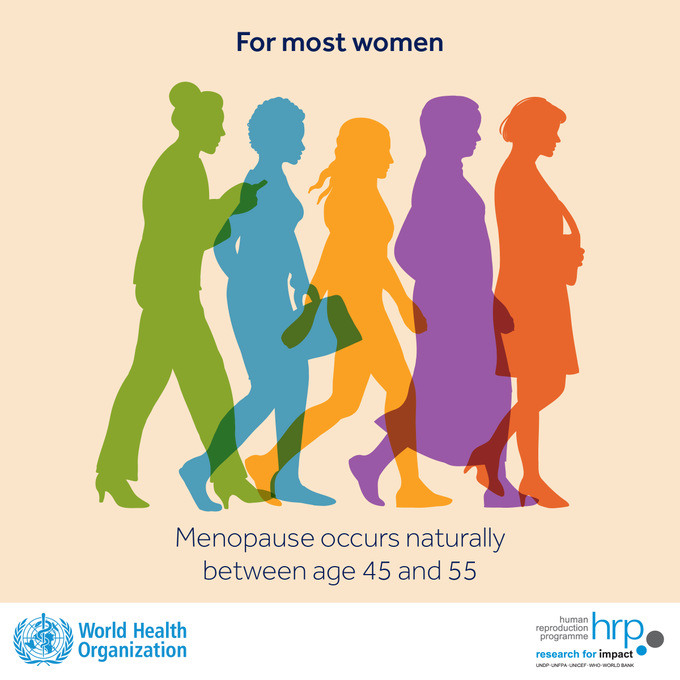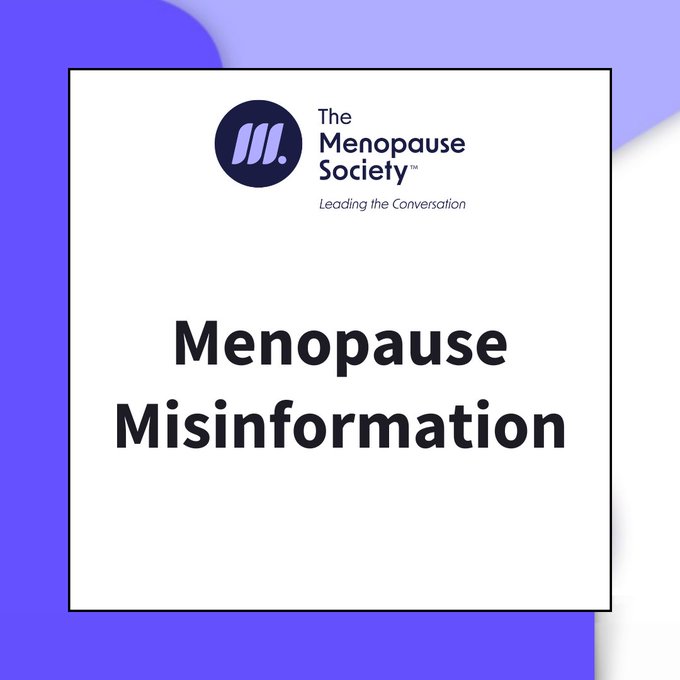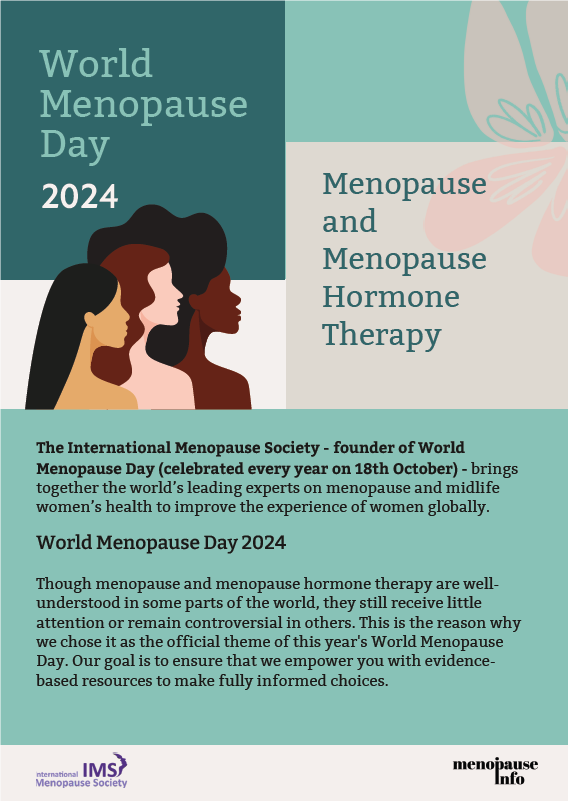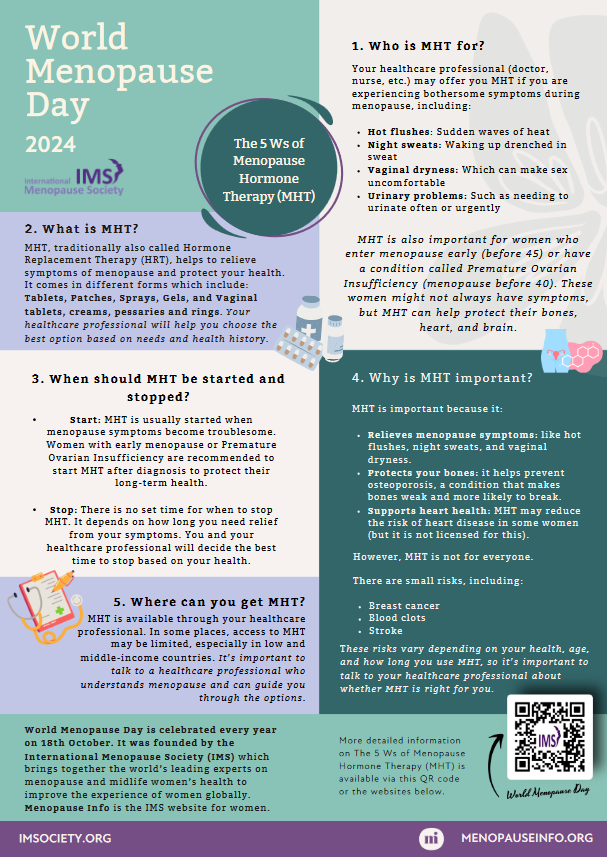“The Women’s Health Initiative (WHI)
is a long-term national health study funded by the
National Heart, Lung, and Blood Institute, or NHLBI”.1
Date
What can it be important to be clear about with hormone therapy (HT) information?
It can be important to be clear about the date of all information including the date of HT information, because this information may have been updated.
Symptoms or Chronic Conditions
What can it also be important to be clear about with HT information?
It can also be important to be clear about whether HT information is about the use of HT for the management of menopausal symptoms such as hot flushes, night sweats and vaginal dryness; or for the prevention of chronic conditions such as cardiovascular disease, cancers, and osteoporotic fractures.
Women’s Health Initiative
What is the (United States) Women’s Health Initiative (WHI)?
In About WHI the WHI elaborate on:
Goal
What was the goal of the WHI?
In Women’s Health Initiative (WHI): What Is the Goal of the WHI? the (United States) National Heart, Lung, and Blood Institute (NHLBI) explain:
Original WHI Study Dates
When was the original WHI study?
In About WHI the WHI note:
Original WHI Study
In the original WHI study, what were the three parts?
In Women’s Health Initiative (WHI): What Is the Goal of the WHI? the NHLBI explain:
Heart Disease
What did the WHI find about hormone replacement therapy and heart disease?
In Women’s Health Initiative (WHI): At A Glance the NHLBI note:

- “The WHI found that hormone replacement therapy did not prevent heart disease in postmenopausal women as once thought”.6
Hormone Replacement Therapy
What did the WHI’s first results in 2002 for hormone replacement therapy (HRT) show?
In The Controversial History of Hormone Replacement Therapy: Abstract the authors elaborate on:
Extension Studies
What are the WHI’s extension studies?
In About WHI the WHI explain:
Extension Studies Main Areas of Research
What are the extension studies main areas of research?
In About WHI the WHI elaborate on:
Chronic Disease Prevention
What do the authors conclude about the prevention of cardiovascular disease or other chronic diseases in The Women’s Health Initiative Randomized Trials and Clinical Practice, published 01 May 2024?
In The Women’s Health Initiative Randomized Trials and Clinical Practice: Abstract – Conclusions and Relevance the authors conclude:
On page four of Menopause and Menopause Hormone Therapy: 2. What Is MHT? the International Menopause Society’s (IMS) Leaflet for Women for World Menopause Day 2024 on the 18 October, the IMS note:
Vasomotor Symptoms
What do the authors conclude about vasomotor symptoms in The Women’s Health Initiative Randomized Trials and Clinical Practice?
In The Women’s Health Initiative Randomized Trials and Clinical Practice: Abstract – Conclusions and Relevance the authors conclude:
November 2025 WHI Response
What is the WHI’s response to the proposed FDA removal of black box warning on hormonal therapies?
In News From the WHI Study. WHI Responds To FDA Removal of Black Box Warning on Hormonal Therapies, dated 11 November 2025, the WHI elaborate on:
Health Care Provider
What if I choose to use HT?
In Menopause Hormone Therapy: Is It Right for You? The Bottom Line: Menopause Hormone Therapy Isn’t All good or All Bad, dated 18 April 2025, the (United States) Mayo Clinic include:
If you’re already taking menopause hormone therapy, check in with your healthcare professional regularly to reassess your need for treatment”.13
Health Topics A-Z
Where may I find Health Topics A-Z related to the Women’s Health Initiative?
In Health Topics A-Z you may find:
Health Topics A-Z
- Hormone Therapy
- Hormone Therapy 2016 Revised Global Consensus Statement
- Hormone Therapy 2022 Update for Chronic Conditions
- Hormone Therapy Benefits and Risks
- Hormone Therapy Videos
- Hormone Therapy and Estrogen Plus Progestogen Therapy
- Hormone Therapy and Estrogen Therapy
- Menopause
- Menopause Videos 2025
- Postmenopause and Chronic Disease Prevention
Links
Where may I find Links related to Women’s Health Initiative?
Your Country may have Links similar to:
Links
This Links List to third party websites is neither comprehensive nor exhaustive. Inclusion on this Links List does not imply endorsement or recommendation. Non-inclusion on this Links List does not imply non-endorsement or non-recommendation. Third party websites are not under the control of Meno Martha International Menopause Directory. Third party websites may contain explicit medical images and/or sexual references. Please read Meno Martha International Menopause Directory’s Links Policy before proceeding to a Link. Please contact Webmaster if you experience a problem with a Link.U.S. Menopausal Hormone Therapy Labeling To Be Updated, November 2025
- Celebrating the Removal But Cautioning the Removal of All Warnings on HRT [10 November 2025]
- EMAS On-Demand Webinars [European Menopause and Andropause Society] [Multiply Languages]: FDA Decision on MHT Warnings – A Live EMAS Roundtable [20 November 2025]
- FDA Direct: Removing Black Box Warnings for HRT (Part 1/2) [10 November 2025]
- FDA Direct: Removing Black Box Warnings for HRT (Part 2/2) [11 November 2025]
- FDA Expert Panel on Menopause and Hormone Replacement Therapy for Women [17 July 2025]
- FDA Removes Black Box Warning on HRT- What Does That Mean for the UK [11 November 2025]
- Fact Sheet: FDA Initiates Removal of “Black Box” Warnings From Menopausal Hormone Replacement Therapy Products [10 November 2025]
- HHS Advances Women’s Health, Removes Misleading FDA Warnings on Hormone Replacement Therapy [10 November 2025]
- News From the WHI Study. WHI Responds To FDA Removal of Black Box Warning on Hormonal Therapies [11 November 2025]
- Updated Labeling for Menopausal Hormone Therapy [10 November 2025]
Women’s Health Initiative New or Updated
- Hormone Replacement Therapy After the WHI: Clinician’s Evidence Timeline (2002–2025) [14 November 2025]
- International Menopause Society (IMS) Recommendations and Key Messages on Women’s Midlife Health and Menopause [23 December 2025]
- Menopausal Hormone Therapy and Cardiovascular Diseases In Women With Vasomotor Symptoms: A Secondary Analysis of the Women’s Health Initiative Randomized Clinical Trials [01 November 2025]
- Physical Activity and Stroke Incidence Among Post-Menopausal Women: Insights From the Women’s Health Initiative [18 September 2025]
- The Women’s Health Initiative Trials: Clinical Messages [17 July 2024]
- WHI News and Recent Publications
- ACOG Explains: Managing Menopause Symptoms [American College of Obstetricians and Gynecologists]
- A Systematic Review and Critical Appraisal of Menopause Guidelines
- About WHI
- Association Between Insomnia, Stress Events, and Other Psychosocial Factors and Incident Atrial Fibrillation In Postmenopausal Women: Insights From the Women’s Health Initiative
- BMS TV: Coronary Heart Disease (CHD)
- BMS TV: HRT and Breast Cancer: Overall Risks and Benefits
- BMS TV: HRT and the Risk of Breast Cancer
- Bioidentical Hormones: Are They Safer?
- Blood Pressure Control and Glaucoma Risk In Postmenopausal Women: An Analysis From the Women’s Health Initiative
- Celebrating the Removal But Cautioning the Removal of All Warnings on HRT [10 November 2025]
- Chocolate Consumption In Relation To All-Cause and Cause-Specific Mortality In Women: The Women’s Health Initiative
- Consumer Video and Podcast Series: 2024 Consumer Videos and Podcasts – Preparing for Your Menopause Healthcare Visit
- EMAS On-Demand Webinars [European Menopause and Andropause Society] [Multiply Languages]: FDA Decision on MHT Warnings – A Live EMAS Roundtable
- FDA Direct: Removing Black Box Warnings for HRT (Part 1/2)
- FDA Direct: Removing Black Box Warnings for HRT (Part 2/2)
- FDA Expert Panel on Menopause and Hormone Replacement Therapy for Women
- FDA Removes Black Box Warning on HRT- What Does That Mean for the UK
- Fact Sheet: FDA Initiates Removal of “Black Box” Warnings From Menopausal Hormone Replacement Therapy Products
- Find A Menopause Practitioner [United States and Other]
- Find A Practitioner [Australasian Menopause Society i.e. Australia and New Zealand]
- Find Your Nearest BMS Menopause Specialist [British Menopause Society]
- Getting At the Heart of Needs In Women’s Heart Health
- HHS Advances Women’s Health, Removes Misleading FDA Warnings on Hormone Replacement Therapy
- HRT Questions Answered
- HRT Types and Doses | Dr Louise Newson
- HRT – Types, Doses and Regimens
- HRT: Benefits and Risks
- HRT: Summary
- HRT: The History – HRT Timeline
- Here’s What RFK Jr., FDA Got Wrong About Menopausal Hormone Therapy — Ob/Gyns Say We Shouldn’t Return To the Days of Estrogen-for-all, Before WHI Results
- Hormone Replacement Therapy (HRT)
- Hormone Replacement Therapy (HRT): Benefits and Risks of Hormone Replacement Therapy (HRT)
- Hormone Replacement Therapy After the WHI: Clinician’s Evidence Timeline (2002–2025)
- Hormone Therapy In Postmenopausal Persons: Primary Prevention of Chronic Conditions
- Hot Flashes: What Can I Do? [+ Video: What Are the Signs and Symptoms of Menopause?]
- International Menopause Society (IMS) Recommendations and Key Messages on Women’s Midlife Health and Menopause
- Infertility and Risk of Heart Failure In the Women’s Health Initiative
- Long-Term Changes To Cardiovascular Biomarkers After Hormone Therapy In the Women’s Health Initiative Hormone Therapy Clinical Trials
- Longitudinal Patterns of Abdominal Visceral and Subcutaneous Adipose Tissue, Total Body Composition, and Anthropometric Measures In Postmenopausal Women: Results From the Women’s Health Initiative
- Menopausal Hormone Therapy Trends Before Versus After 2002: Impact of the Women’s Health Initiative Study Results
- Menopausal Hormone Therapy and Cardiovascular Diseases In Women With Vasomotor Symptoms: A Secondary Analysis of the Women’s Health Initiative Randomized Clinical Trials [01 November 2025]
- Menopausal Hormone Therapy and Change In Physical Activity In the Women’s Health Initiative Hormone Therapy Clinical Trials
- Menopause
- Menopause

- Menopause

- Menopause Hormone Therapy: Is It Right for You?
- Menopause Map: Downloadable Resources – My Personal Path Print Tools: Questions for Your Health Care Provider

- Menopause: Identification and Management [NICE Guideline Published: 12 November 2015 Last Updated: 07 November 2024]

- Menopause: Identification and Management: NICE Guideline [NG23] Published: 12 November 2015 Last Updated: 07 November 2024
- Metabolomic Evaluation of Air Pollution-Related Bone Damage and Potential Mediation In Women’s Health Initiative Participants
- News From the WHI Study. WHI Funding Announcement. WHI Funding Update [06 May 2025, 25 April 2025…]
- News From the WHI Study. WHI Responds To FDA Removal of Black Box Warning on Hormonal Therapies [11 November 2025]
- Perimenopause
- Perimenopause
- Persistent Gap In Menopause Care 20 Years After the WHI: A Population-Based Study of Menopause-Related Symptoms and Their Management
- Physical Activity and Stroke Incidence Among Post-Menopausal Women: Insights From the Women’s Health Initiative
- Pre-Pandemic Leukocyte Count Is Associated With Severity of Post-Acute Sequelae of SARS-CoV-2 Infection Among Older Women In the Women’s Health Initiative
- Psychosocial Stress and Bone Loss Among Postmenopausal Women: Results From the Women’s Health Initiative
- Q&A: At 20 Years, WHI Emphasizes Personalized Postmenopausal Care, Shared Decision-Making
- Reappraising 21 Years of the WHI Study: Putting the Findings In Context for Clinical Practice
- Relationships of Depression and Antidepressant Use With Epigenetic Age Acceleration and All-Cause Mortality Among Postmenopausal Women
- The 2023 Practitioner’s Toolkit for Managing Menopause
- The Menopause Society Statement on Misinformation Surrounding Hormone Therapy

- The Role of Topical Vaginal Oestrogen
- The Women’s Health Initiative
- The Women’s Health Initiative Randomized Trials and Clinical Practice
- The Women’s Health Initiative Randomized Trials of Menopausal Hormone Therapy and Breast Cancer: Findings In Context
- The Women’s Health Initiative Study and Hormone Therapy – What Have We Learned 10 Years On?
- The Women’s Health Initiative Trials: Clinical Messages
- ‘Tis But A Scratch: A Critical Review of the Women’s Health Initiative Evidence Associating Menopausal Hormone Therapy With the Risk of Breast Cancer
- Updated Labeling for Menopausal Hormone Therapy [10 November 2025]
- Videos & Podcasts: Videos – Cardiovascular Disease In Women
- Videos & Podcasts: Videos – Preventing Bone Loss At Menopause
- Video & Podcast Library: Videos – World Menopause Day 2024: Menopause and Hormone Therapy: Current Perspectives and Controversies
- Videos & Podcasts: Videos – Menopause and Hormone Therapy: Current Perspectives and Controversies
- Videos and Podcasts: Videos – The Women’s Health Initiative – What Can We Believe?
- WHI News and Recent Publications
- Webinars: Approach To Bone Health In the Perimenopause and Postmenopause?
- Webinars: Changing the Paradigm for Earlier Osteoporosis Prevention
- Webinars: Recommendations on Cardiovascular Risk Assessment
- What Is the Difference Between Perimenopause, Menopause and Postmenopause?
- Whi.org [Women’s Health Initiative]
- Women’s Health Initiative (WHI)
- Women’s Health Initiative: Recent Publications
- World Menopause Day 2023

- World Menopause Day 2023: Patient Information Leaflet
- World Menopause Day 2024: Leaflet for Women [Multiply Languages]

- World Menopause Day 2024: Poster for Women – The 5 Ws of Menopause Hormone
 World Menopause Day 2024: The IMS White Paper: Menopause and MHT In 2024: Addressing the Key Controversies [Multiply Languages]
World Menopause Day 2024: The IMS White Paper: Menopause and MHT In 2024: Addressing the Key Controversies [Multiply Languages]
Sources
Where may I find the Sources quoted?
You may find the Sources quoted at:
Sources
- About WHI. Women’s Health Initiative https://www.whi.org/about-whi Accessed: 02 February 2026
- About WHI. Women’s Health Initiative https://www.whi.org/about-whi Accessed: 02 February 2026
- Women’s Health Initiative (WHI): What Is the Goal of the WHI? National Heart, Lung, and Blood Institute https://www.nhlbi.nih.gov/science/womens-health-initiative-whi Accessed: 02 February 2026
- About WHI. Women’s Health Initiative https://www.whi.org/about-whi Accessed: 02 February 2026
- Women’s Health Initiative (WHI): What Is the Goal of the WHI? National Heart, Lung, and Blood Institute https://www.nhlbi.nih.gov/science/womens-health-initiative-whi Accessed: 02 February 2026
- Women’s Health Initiative (WHI): At A Glance. National Heart, Lung, and Blood Institute https://www.nhlbi.nih.gov/science/womens-health-initiative-whi Accessed: 02 February 2026
- Cagannci, A. and Venier, M. The Controversial History of Hormone Replacement Therapy: Abstract. Published Online 18 September 2019 https://www.ncbi.nlm.nih.gov/pmc/articles/PMC6780820/ Accessed: 02 February 2026
- About WHI. Women’s Health Initiative https://www.whi.org/about-whi Accessed: 02 February 2026
- About WHI. Women’s Health Initiative https://www.whi.org/about-whi Accessed: 02 February 2026
- Manson, J.A, E. Crandall, C. J., Rossouw, J. E. et al. The Women’s Health Initiative Randomized Trials and Clinical Practice: Abstract – Conclusions and Relevance. 01 May 2024 https://jamanetwork.com/journals/jama/ Accessed: 02 February 2026
- Manson, J.A, E. Crandall, C. J., Rossouw, J. E. et al. The Women’s Health Initiative Randomized Trials and Clinical Practice: Abstract – Conclusions and Relevance. 01 May 2024 https://jamanetwork.com/journals/jama/ Accessed: 02 February 2026
- News From the WHI Study. WHI Responds To FDA Removal of Black Box Warning on Hormonal Therapies. 11 November 2025. Women’s Health initiative https://www.whi.org/md/news/whi-fda-hrt-warning Accessed: 02 February 2026
- Menopause Hormone Therapy: Is It Right for You? Menopause Hormone Therapy Isn’t All good or All Bad. 18 April 2025. Mayo Clinic https://www.mayoclinic.org/diseases-conditions/menopause/in-depth/hormone-therapy/art-20046372 Accessed: 02 February 2026








